ONLINE COURSE
Sign Up and Start Learning Now!
Try it out firsthand and become a certified professional
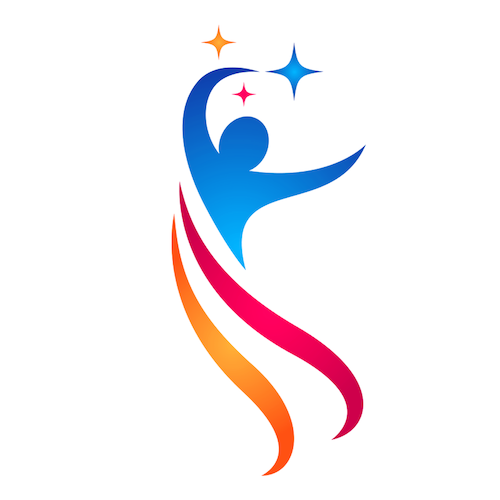
TransformativeStories
A Narrative approach to favour Change
Learn a simple and engaging method to help others develop awareness and regain control over their lives as though they were living a book or movie plot
Sign me up at 50% off (until January 9)

Become a
Certified TransformativeStories Professional (CTSP)!
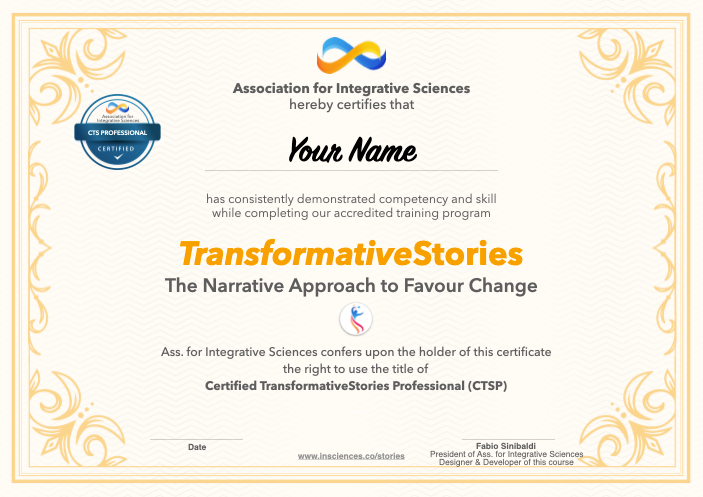
A PRACTICAL METHOD where participants are invited to TRY a series of TOOLS, TECHNIQUES and EXERCISES, that they can APPLY to their professional, therapeutic, formative or development environment FIRSTHAND
IN THIS COURSE YOU WILL LEARN
A new, practical and engaging way to review and rethink every moment of our lives, every decision made or that needs to be made and every past or developing relationship as if it were a book or a film.
It thus becomes easy and exciting to analyse and actively manage the various factors that make up the "story" of your own life:
CHARACTERS, SEQUENCES, DIALOGUES, CHALLENGES, ENVIRONMENT, CONFLICT, PASSIONS, EFFORT, MOTIVATION, ETC.
You will learn various practical exercises that can be carried out in writing or through visualisation, but also by drawing (for those who wish to or in case you work with children). In most cases these exercises, in addition to having a transformative value in the moment in which they are carried out, offer practical cues to change the way we see ourselves, think, speak, make decisions, how we interact with others, etc.

A work method that is accurately organized into 4 work areas
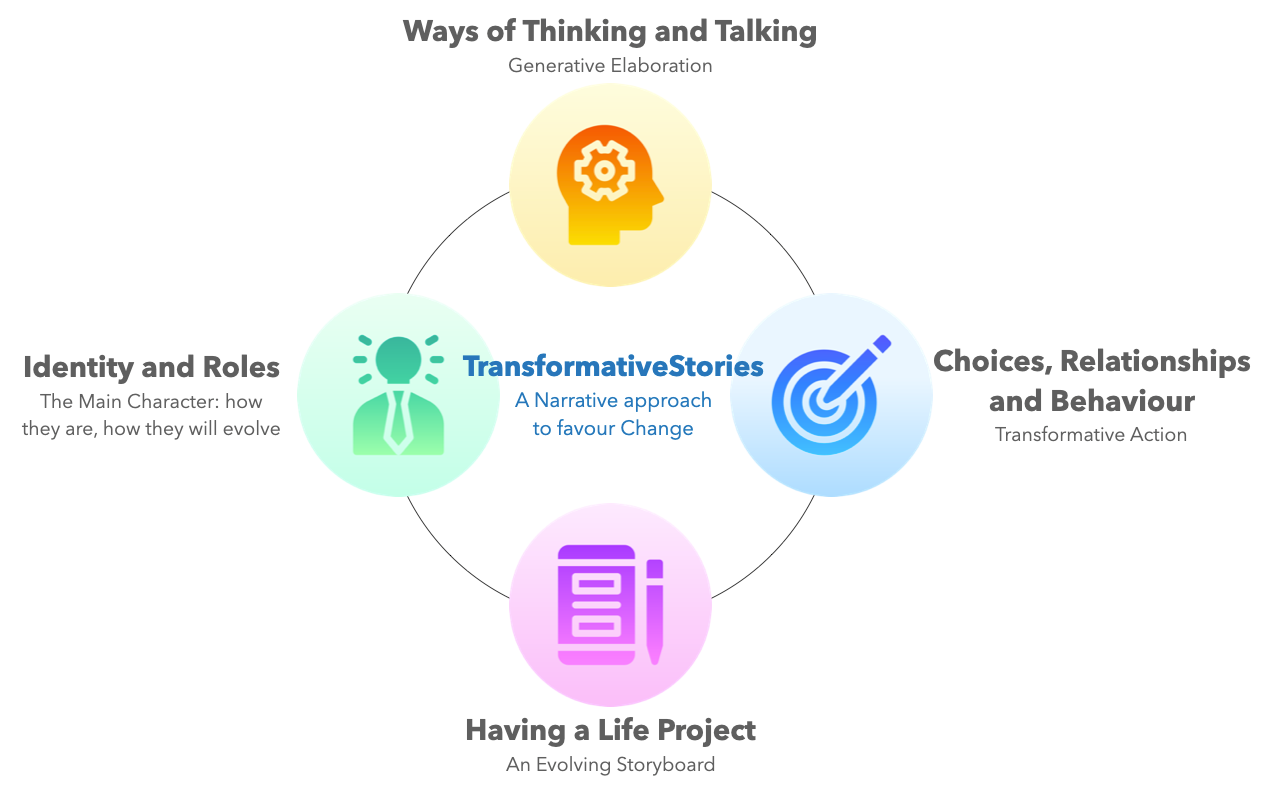
ADVANTAGES OF TRANSFORMATIVESTORIES

A UNIVERSAL ISSUE
Everyone has a clear picture in their mind of how they would like to be, how they would like to act and behave.
Achieving this shouldn’t be a problem or an obsession to be satisfied just for appearance’s sake, rather, it should be the search for full coherence with the best version of ourselves, through our behaviour and daily personal narrative.
It's a common theme, so with this course you'll learn a method and tools through which you can help so many people.

A SOLUTION LOVED BY EVERYONE
We are built and we have evolved to listen and tell stories. It is no coincidence that social networks have introduced stories, Netflix is increasingly successful, and novels are always popular despite the publishing crisis.
In this course you will learn how to use the same mechanisms that make us value and admire others in real life or in fictional stories (conversely, avoiding getting stuck in a role we don't like) to your advantage (yours and/or of the people you work with). To do this we will act on mechanisms that are deeply rooted in our being, in a constructive and effective way, rather than being subjected to them.
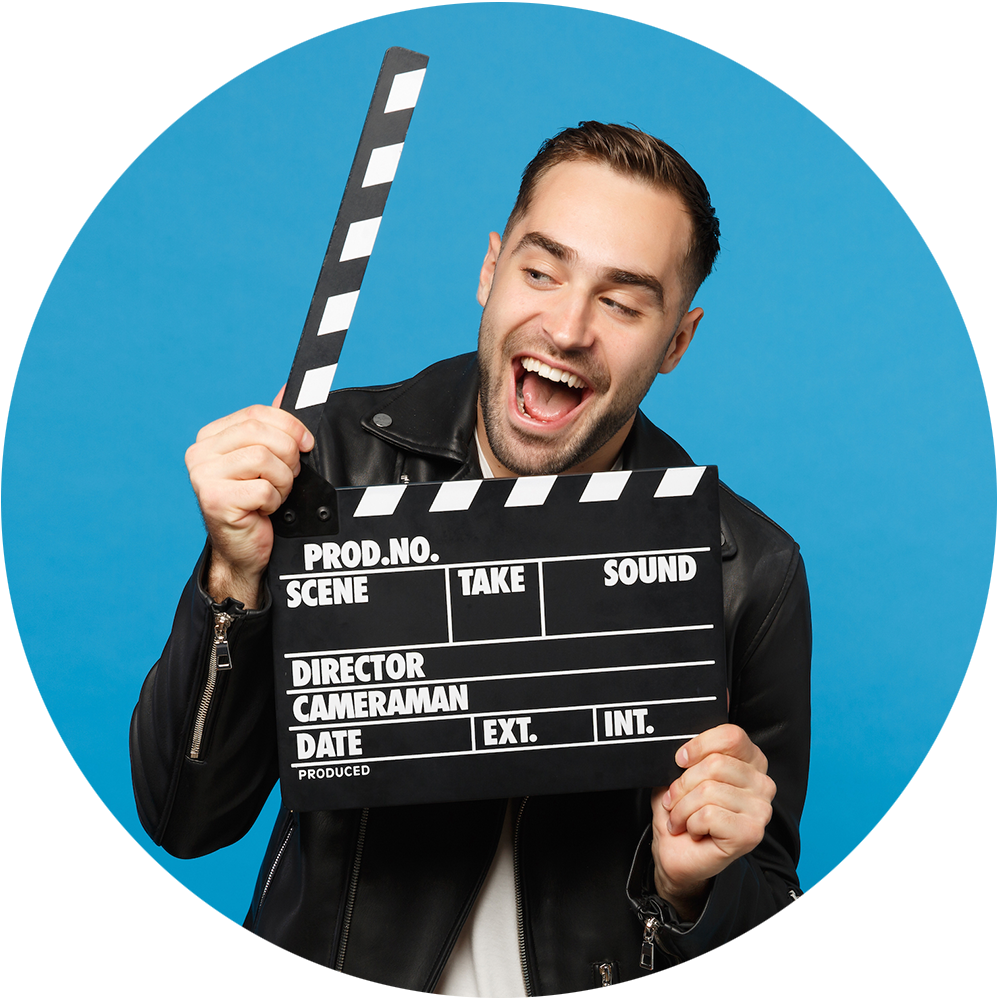
PRACTICAL AND ENGAGING
With this method, STORIES (that are told and that "tell us"), VIDEOS (to look at each other with objectivity) and EXPERIENCES (actions and behaviours put in place on a daily basis) become tools to be used actively and to one's advantage to increase (enhance) self-esteem, personal effectiveness and the sense of being fully present in work situations and relationships.
WORKING ON DEEP-SEATED ISSUES (SUCH AS IDENTITY, VALUE, SAFETY, RELATIONSHIPS, EXPECTATIONS), IN A NATURAL AND ENJOYABLE WAY FOR EVERYONE
An exciting and practical path, of proven effectiveness, which can be re-purposed for individuals or group activities.
An excellent tool for psychologists, coaches, trainers and teachers.

What we’ll talk about and what we’ll do


IDENTITY AND ROLES
The Main Character: how they are, how they will evolve
Roles, objectives and natural relationships
- The innate need to take centre stage: balancing advantages (developmental elements) and disadvantages (dysfunctional elements)
- Heroes or villains: tools to actively choose which role to play, regardless of the past, habits and other people’s demands
- We want to be perfect, but we love imperfect heroes: exercises to clarify and develop a new form of real and effective coherence
- Analyse the evolutionary phases of the character: techniques to stop judging and start understanding others
- How many interactions with the other actors on stage and of what type? Exercises to actively shift between states of comparison, challenge, cooperation, co-construction, evolution, manipulation, etc.
- You cannot be the mentor and the hero of the same story: clarify roles and objectives in different contexts
- There is no main character without a side kick, an antagonist, enemies, supporters: map out power dynamics and change the balance through choice and planning
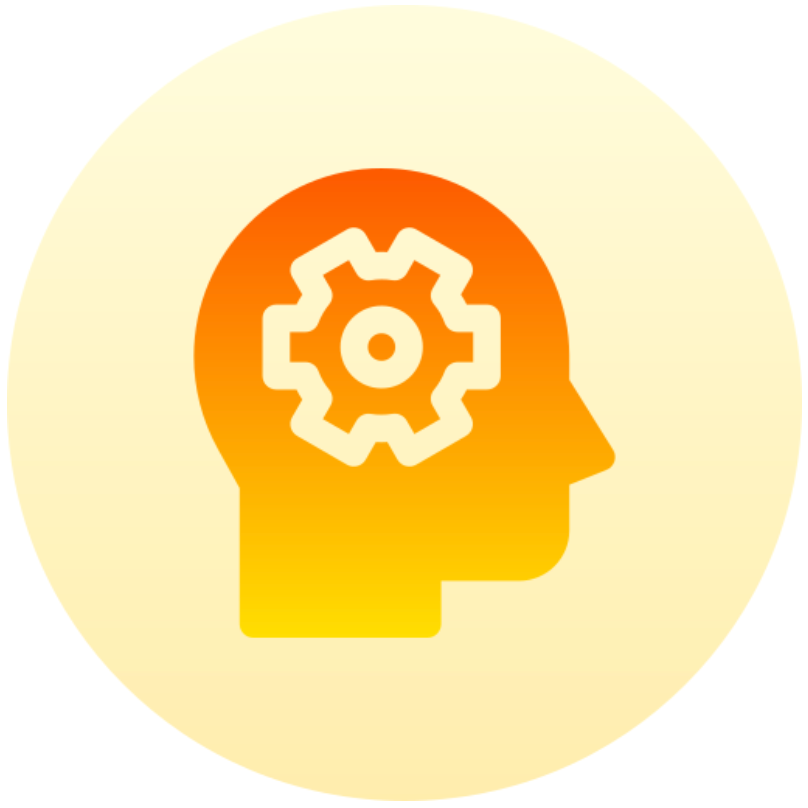
WAYS OF THINKING AND OF TALKING
Generative Elaboration
We are made to listen to and make up stories
- Why do we have to say that very thing (and in that way and at that moment): a powerful tool for understanding ourselves and others
- Telling others about our exploits VS telling them about our misfortunes (2 very different sides of the same coin): changing the narrative we tell ourselves and others
- Unnecessary-words, because they are the most revealing: a very effective analysis and change technique
- The power of not saying anything (or how to develop self-control and gain interpersonal power): self-regulation exercises and relationship modification
- Counter-technique, the power of speech: the power to admit what one thinks and strategies to do so easily
- Techniques for analysing and changing types of communication and their purposes: venting, blaming, understanding, solving, self-convincing, seeking consensus, self-celebrating, belittling, defining closure, etc.
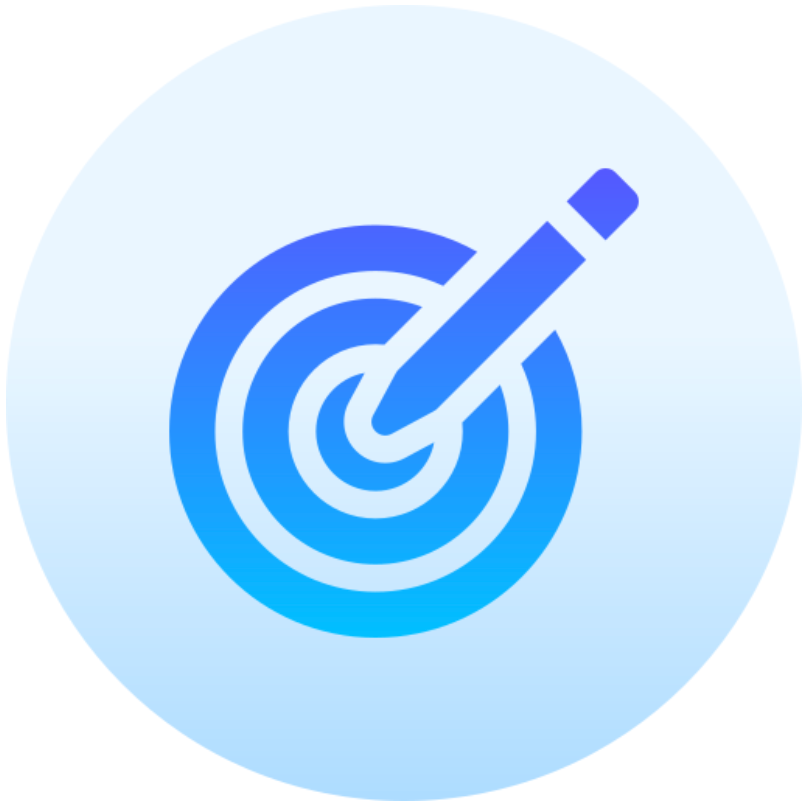
CHOICES, RELATIONSHIPS AND BEHAVIOUR
Transformative Action
Developing narratives for daily living
- The need to share and the need to identify: how to rethink communication exchanges and relationships, changing the way we manage them
- Stories develop basic skills in a natural way: how to use them to foster curiosity, creativity, managing waiting and frustration actively
- “Don’t describe the character, let their actions describe them”: enactment techniques
- Style exercises to easily adopt different points of view and develop acceptance
- Exercises in front of the mirror or with videos from your mobile phone to get to know each other better, remove prejudice and develop new skills
- Canvas or script? Improvisation – even in life – can be developed with the right preparation

HAVING A LIFE PROJECT
An Evolutionary Storyboard
Becoming authors and directors of our own lives
- A narrative that reorganizes plans: developing flexibility, vision and effective strategies
- The relationship between storytelling and human neurobiology: a simple framework for understanding human motivation
- Processing stories (written, told, imagined, drawn, etc.): the best way to actively get in touch with your internal world
- Implement evolutionary processes by rethinking and reworking the "storyboard" of one's life
- Identify and rework turning points with different techniques used by writers and directors to change perspective
- Parallel stories and stories that intertwine: moving between social interactions, elective affinities, solitude and knowing how to be alone
Course Programme
The Character
▹ Welcome, let’s get started!
▹ Characters: what they say Vs what they express + Exercise
▹ The Character: how the writer/director see them + Exercise
▹ Exercise - My three characters
▹ Characters and Archetypes - part 1 + Exercise
▹ Characters and Archetypes - part 2 + Exercise
▹ Characters and Archetypes - part 3 + 3 Exercises
The Character's Evolutionary Arc
▹ The character’s need to evolve + Exercise "My relationship with change"
▹ Part 1: Exposition and Inciting Incident + Exercise "The momentum of change"
▹ Part 2: Crisis and Training + Exercise "My Mentor and Training"
▹ Part 3: Climax and Dénouement + Exercise "Recurring patterns and Change"
Power, Relationship and Change
▹ Part 1 - Warm or cold Power?
▹ Exercises part 1 - am I sure I deserve the power?
▹ Part 2 - Being powerless
▹ Exercises part 2 - Dealing with little power
▹ Part 3 - The perception of the other
▹ Exercises part 3 - Perspectives, Behaviours and Effectiveness
The stories we tell and share
▹ Everyone loves stories
▹ Exercise: the stories we tell ourselves
▹ Exercise: The stories we share over social networks
▹ Style exercises
▹ Style exercises - Usage and Efficacy variations
Stories are a form of self-care
▹ The power of stories: what a story can trigger within us
▹ Dopamine - Exercise
▹ Oxytocin - Exercise
▹ Endorphins - Exercise
Widening the perspectives
▹ The narrative cycle
▹ Exercise: telling the story from a different point of view
▹ Exercises: Observing stories + Noticing types of behaviour
▹ Technique: Life’s storyboard
▹ Congrats! + Certification
ONE METHOD, ENDLESS OPPORTUNITIES FOR YOUR PROFESSION
The methods and techniques tried out in the course can be applied to different environments and with different purposes. They are flexible tools, the result of the reworking writing, screenplay and theatre methods and techniques revised and modified through the Integrative Sciences.
The complete sequence of activities can be reproposed entirely and constitutes the methodological heart of INDIVIDUAL therapeutic or development JOURNEYS, providing a pragmatic approach and offering activities to be carried out independently between one session and another, involving the individual actively so as to make change lasting and effective.
Alternatively, a few select techniques can be chosen to be included as targeted insights, for example, on identity, resources, relational or communication styles.

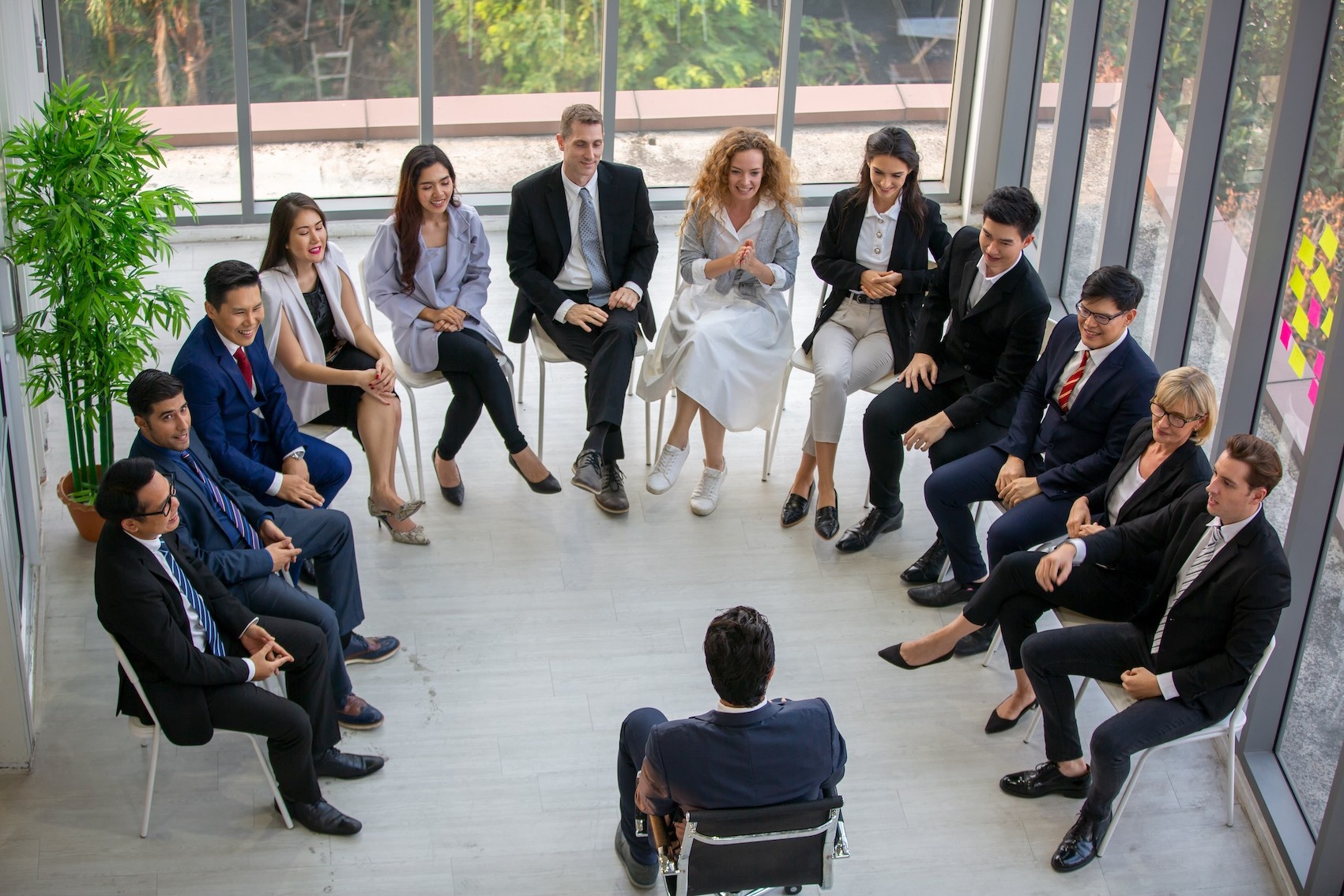
This approach is also well suited for GROUP WORK, both with young people in education and in adult training contexts.
In these cases, it is interesting to see how individual plans can intertwine with group, organizational and institutional objectives.
The focus on one's own and others' behaviour and perceptions, set up in a constructive way, allows you to act directly on areas for improvement, avoiding any risk of denial or a priori resistance.

Who is the course for?
The course deals with transversal themes, useful in every field in which self-perception, the right balance between acceptance and the desire to evolve, knowing how to be the best version of ourselves seamlessly, communication methods, relationship styles and every other theme deeply rooted in human existence are relevant.
We work in a targeted and flexible way on these aspects which can be applied in different care, health, education environments or to enhance skills and knowledge.
Participants typically include: psychologists and psychotherapists, coaches, counsellors, teachers, trainers, but also doctors, physiotherapists and osteopaths that are interested in the relational and psychological aspects of their work.
All references and templates are presented so they can be used regardless of prior expertise.
The method, models and techniques learned can be used in a stand-alone approach or in integration and synergy with existing theoretical models and reference techniques within each profession.
THE AUTHOR OF THIS METHOD
Fabio Sinibaldi, PsyD, MBPsS
Fabio is an expert in Applied Neurosciences and PsychoNeuroEndocrineImmunology which he combines with an evolutionary and ethological standpoint.
With an international career spanning more than 20 years, he is the founder of the Association for Integrative Sciences and of the Real Way of Life research and training institutes.
Working as a clinician, researcher and trainer, he is the developer of the Integrative Sciences, the Switch Model, the Integrative Functional Patterns, Isometric Emotions techniques, Ideographic Thinking, and several other integrative techniques (developed to manage psychosomatic diseases, chronic stress, trauma, self-regulation, emotions, development processes, etc. in a targeted way).
His work incorporates: neuroplasticity, brain and mental metabolism, brain networks, nutritional neuroscience, primal social intelligence, mental-postural-emotional-motor flows, and more.
He conducts seminars on The Switch Model throughout the world.
Lecturer at post graduate schools of psychotherapy and counselling, he holds seminars for universities and institutions in different countries.
Fabio regularly attends national and international congresses as a speaker, as well as an author of many successful books and articles published in different languages, including:
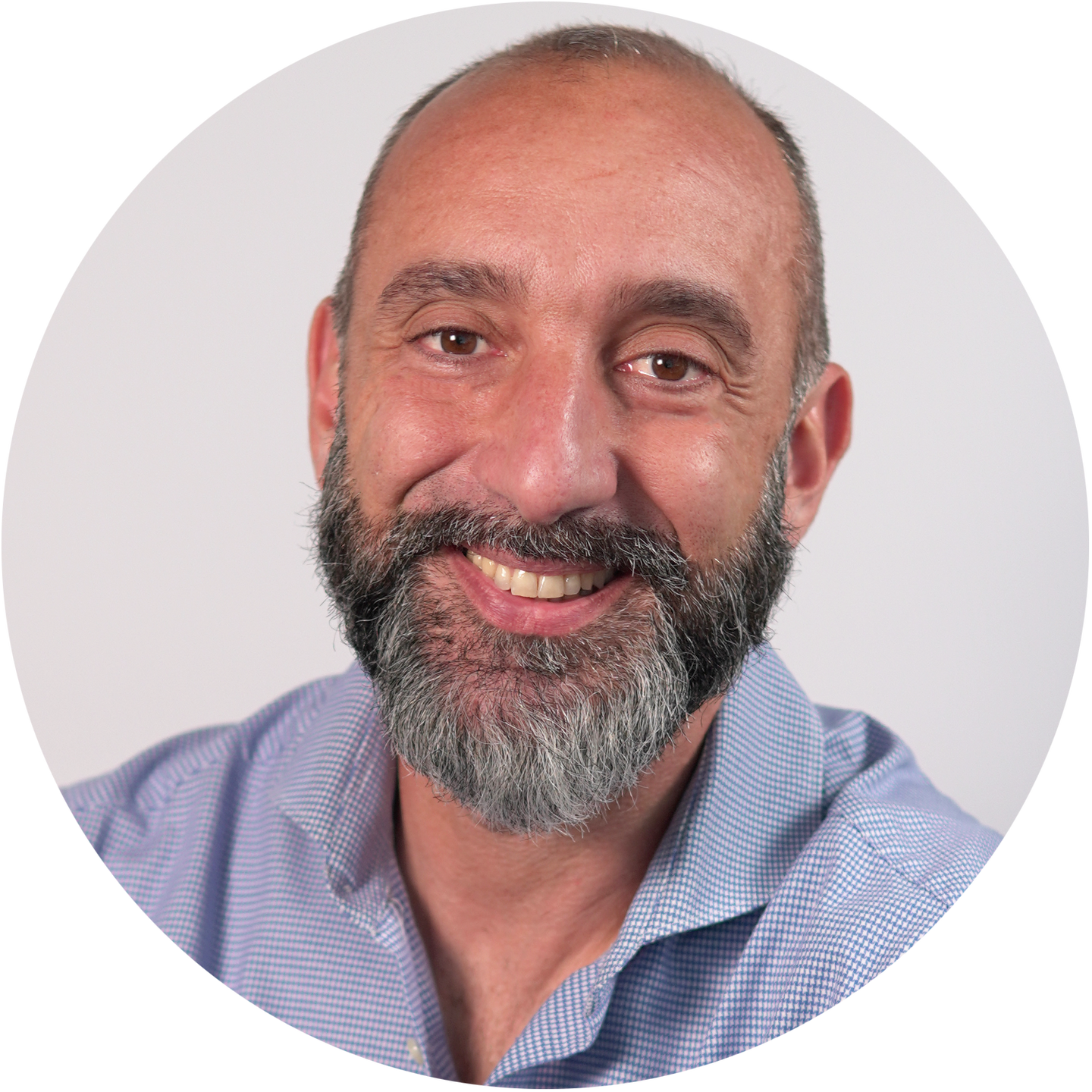

Olivia Thompson
“Narrative medicine and story-telling have always fascinated me... but this workshop is something different, much broader and more transversal. And above all, it makes the difference: the level of depth and coherence makes everything exponentially effective.”


Sophia Martin
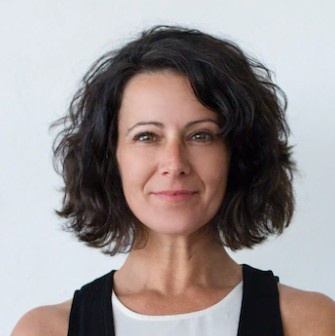
Elizabeth Harris
“This workshop changed my way of working. I followed it without expectations, just trusting Fabio and Sara's professionalism (I took other courses with them before this one), but now I always introduce at least some element in every project.”
REGISTER NOW!
PROMOTIONAL OFFER – 50 %!
Please note: this course is not part of the Integrative Sciences HUB or of the Master in Applied Integrative Sciences course, it is an independent study plan. Reduced fee for members, read the details below.
Offer valid to January 9!
- After that available for € 190 (=~ $202 USD / £167 GBP)
Standard Registration 97 €
(=~ $80 USD / £85 GBP)
HUB Member Registration 67 €
(=~ $55 USD / £59 GBP)

